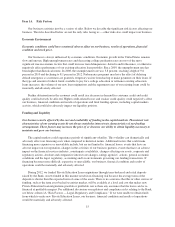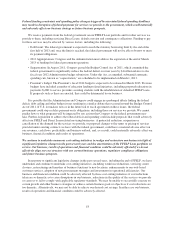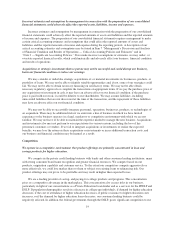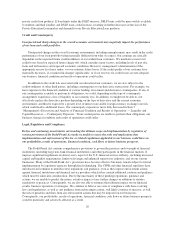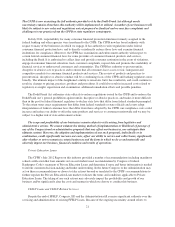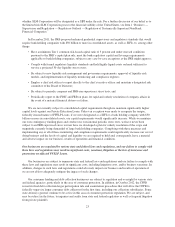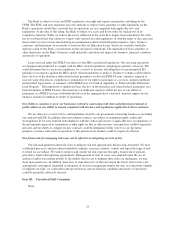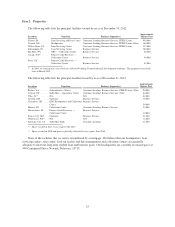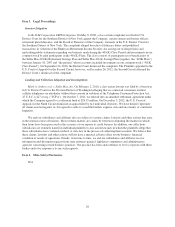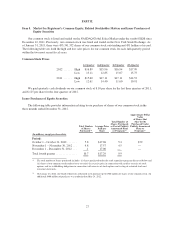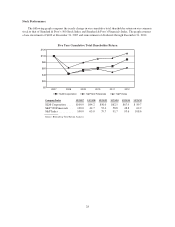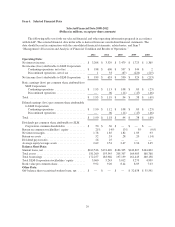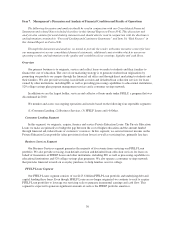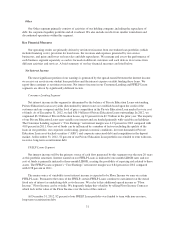Sallie Mae 2012 Annual Report Download - page 23
Download and view the complete annual report
Please find page 23 of the 2012 Sallie Mae annual report below. You can navigate through the pages in the report by either clicking on the pages listed below, or by using the keyword search tool below to find specific information within the annual report.The CFPB is now exercising the full authority provided to it by the Dodd-Frank Act although much
uncertainty remains about how this authority will be implemented or utilized. A number of our businesses will
likely be subject to new rules and regulations not yet proposed or finalized and we may face complaints and
challenges to our practices from the CFPB or state regulatory counterparts.
In July 2011, responsibility for many consumer financial protection functions formerly assigned to the
federal banking and other agencies were transferred to the CFPB. The CFPB now has broad authority with
respect to many of the businesses in which we engage. It has authority to write regulations under federal
consumer financial protection laws, and to directly or indirectly enforce those laws and examine financial
institutions for compliance. Moreover, the CFPB has examination and enforcement authority with respect to
certain federal consumer financial laws for some providers of consumer financial products and services,
including the Bank. It is authorized to collect fines and provide consumer restitution in the event of violations,
engage in consumer financial education, track consumer complaints, request data and promote the availability of
financial services to underserved consumers and communities. The CFPB has authority to prevent unfair,
deceptive or abusive acts or practices and to ensure that all consumers have access to fair, transparent and
competitive markets for consumer financial products and services. The review of products and practices to
prevent unfair, deceptive or abusive conduct will be a continuing focus of the CFPB and banking regulators more
broadly. The ultimate impact of this heightened scrutiny is uncertain, but it has resulted in, and could continue to
result in, changes to pricing, practices, products and procedures. It could also result in increased costs related to
regulatory oversight, supervision and examination, additional remediation efforts and possible penalties.
The Dodd-Frank Act authorizes state officials to enforce regulations issued by the CFPB and to enforce the
Dodd-Frank Act’s general prohibition against unfair, deceptive or abusive practices, and makes it more difficult
than in the past for federal financial regulators to declare state laws that differ from federal standards preempted.
To the extent states enact requirements that differ from federal standards or state officials and courts adopt
interpretations of federal consumer laws that differ from those adopted by the CFPB, our compliance costs could
increase and reduce our ability to offer the same products and services to consumers nationwide and we may be
subject to a higher risk of state enforcement actions.
The scope and profitability of our businesses remain subject to risks arising from legislative and
administrative actions. We cannot estimate the timing, method of implementation or likelihood of passage of
any of the Congressional or administrative proposals that may affect our businesses, nor anticipate their
ultimate content. However, the adoption and implementation of any such proposals, individually or in
combination, could significantly increase our costs, affect our ability to service and collect loans, significantly
alter whether or not we remain in certain businesses and the form in which we do so and materially and
adversely impact our business, financial condition and results of operations.
Private Education Loans
The CFPB’s July 2012 Report on this industry provided a number of recommendations including mandatory
school certification that loan amounts not exceed student need, reconsideration by Congress of federal
Bankruptcy Code’s treatment of Private Education Loans and determine if more and better information is needed
to inform consumer decision-making and lender underwriting. In the future Congress or the Administration may
act on these recommendations or choose to take actions beyond or unrelated to the CFPB’s recommendations to
further regulate the Private Education Loan market or dictate the terms and conditions applicable to Private
Education Loans. The taking of any such actions may adversely impact the profitability and growth of our
business and/or significantly alter the costs and manner in which we choose to conduct this business.
FFELP Loans and FFELP-Related Services
Despite the end of FFELP, Congress, ED and the Administration still exercise significant authority over the
servicing and administration of existing FFELP Loans. Because of the ongoing uncertainty around efforts to
21






